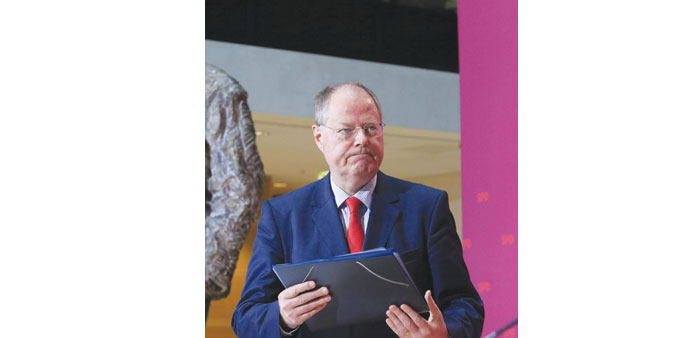AFP/Berlin
Angela Merkel’s chief rival in next month’s election landed in hot water yesterday for saying that the German leader lacked a “passion for Europe” because she grew up in the communist East.
Peer Steinbrueck, Merkel’s Social Democrat (SPD) challenger in the September 22 poll, said it was a liability at a time of crisis that the chancellor had not been steeped in the pro-Europe traditions of post-war West Germany.
“The fact that she until 1989/1990 had a very different personal and political socialisation than those who experienced European integration since the early 1950s ... in my eyes plays a role,” he said at a debate on Sunday organised by a Berlin newspaper, referring to the fall of the Berlin Wall and German reunification.
He insisted that he did not mean his remarks as an “accusation” against her, noting “she had no choice whether she grew up on the Eastern or Western side of Germany or Europe”.
But Steinbrueck, 66, said that with Merkel’s outsized influence in the EU debate on resolving the crippling debt crisis, she was shirking her responsibility to provide a vision for the bloc.
Lothar Bisky, a European Parliament deputy and former head of the far-left Linke party, which has roots in East German communism, blasted Steinbrueck’s comments as “simply hogwash”.
He told the daily Tagesspiegel yesterday that the SPD contender had managed to alienate millions of east German voters, “branding them for life” as ill-prepared for democracy.
Bisky said that although the conservative Merkel, 59, came from the opposite end of the political spectrum, “the notion that Europe is foreign to her I consider to be a load of rubbish”.
The premier of the eastern state of Thuringia, Christine Lieberknecht of Merkel’s Christian Democrats (CDU), said Steinbrueck failed to understand easterners’ history and convictions.
“The citizens of former East Germany in particular fought passionately for freedom in a peaceful Europe and benefited from it. Indeed it was East Germans who were prisoners of their own country and longed for freedom in a united Europe,” she said.
Merkel’s own parliamentary group leader, Volker Kauder, called Steinbrueck’s remarks “simply wacky”.
“If anyone has held Europe together in the crisis, it’s been the chancellor,” he told the daily Rheinische Post.
Political scientist Klaus Schroeder of Berlin’s Free University said that easterners were indeed socialised differently and this led them among other things to be more sceptical about the euro than their western counterparts.
“There are surely more easterners who still have something against the euro, simply because they got the deutschmark they had dreamt of for years and thought the euro had to be worse,” he said.
“But that has nothing to do with whether someone has a connection to Europe – as an idea, as a continent, as a political unit.”
With six weeks to go until the election, the SPD is trailing Merkel’s CDU by around 15 points in opinion polls, as the often brash Steinbrueck has struggled to find grounds on which to attack Merkel.
Steinbrueck’s party has declined to comment on his latest remarks, referring queries to the candidate himself.
Schroeder said that Steinbrueck’s “unbelievable” statements failed to recognise the real reason that the German leader, Forbes magazine’s most powerful woman in the world, does not deliver soaring rhetoric.
“It’s Merkel’s political style – it has nothing to do with where she’s from. She is not a passionate politician. She is a pragmatic, reserved, cold-seeming politician but in all areas and not just with relation to Europe,” he told AFP.
“(Steinbrueck’s remarks) smack of 11th-hour panic. Voters are looking at France, Spain and Portugal and realising that Germany is doing pretty well in comparison.
“That is the bonus she has and when Steinbrueck attacks her on the wrong grounds, he will accomplish nothing.”

Steinbrueck
